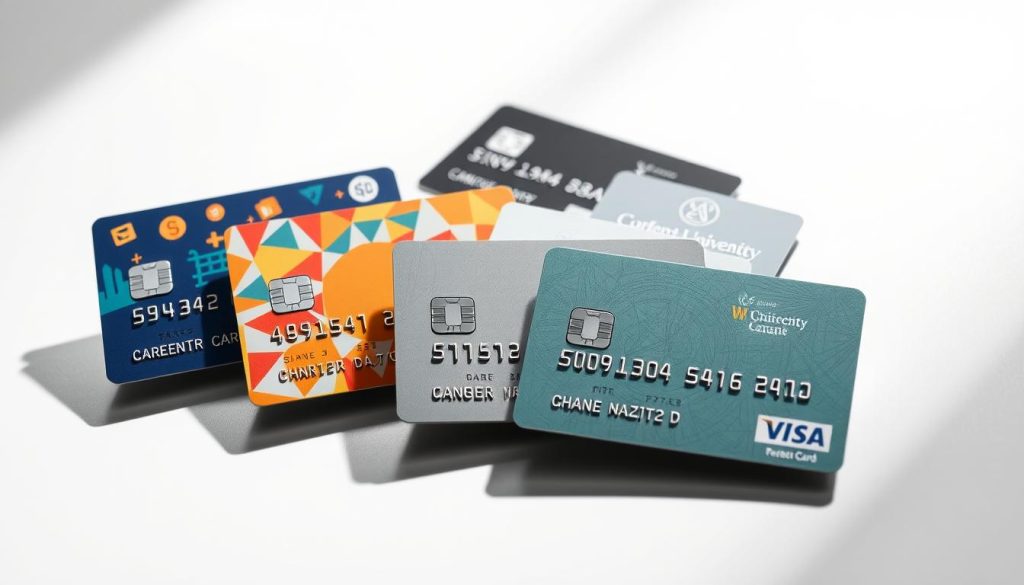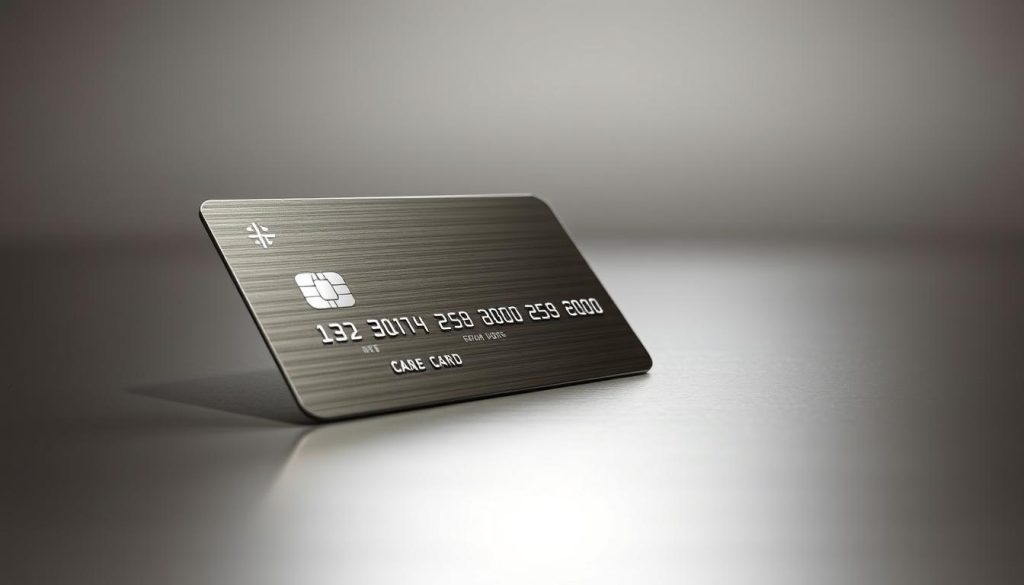Understanding credit card pre-approvals is key in personal finance. These offers are made by banks to people with good credit scores. This means they are likely to get a credit card.
Your credit score is very important for getting these offers. Credit card pre-approvals can be good because they let you get credit at a lower interest rate.

In the United States, banks often give out credit card pre-approvals. This can be a smart way to get a credit card without the usual application hassle. Knowing how pre-approvals work and how they affect your credit score helps you make better financial choices.
Key Takeaways
- Credit card pre-approvals are offers made by banks to potential customers with a good credit score.
- Your credit score plays a significant role in determining whether you receive a pre-approval offer.
- Credit card pre-approvals can provide access to credit at a potentially lower interest rate.
- Understanding credit card pre-approvals is crucial for making informed decisions about personal finance.
- Credit card pre-approvals can impact your credit score, so it’s essential to manage them wisely.
- Credit card pre-approvals are a common practice among banks in the United States.
Understanding Credit Card Pre-approvals
When you get a pre-approval for a credit card, it’s a good sign. The issuer has looked at your credit and thinks you’re a good fit. Your credit score plays a big role here. It shows if you’ll pay back your debts on time and can affect the interest rate you get.
The pre-approval process is more detailed than pre-qualification. Pre-qualification checks if you’re eligible for a card. But pre-approval dives deeper into your credit profile. Credit card offers are made just for you, based on your income, debt, and credit history.
Here are some key factors to consider when receiving a pre-approval for a credit card:
- Your credit score and how it affects your interest rate
- The terms and conditions of the credit card offer, including the interest rate and fees
- The credit limit and how it will affect your debt-to-income ratio

Understanding the pre-approval process helps you make smart choices. You can pick the right card and manage your credit well.
Pre-approval vs. Pre-qualification: Key Differences
Understanding the difference between pre-approval and pre-qualification is key when applying for credit cards. Pre-approval means a credit card issuer thinks you’ll likely get approved based on your credit score and other factors. Pre-qualification, however, is a first check of your creditworthiness but doesn’t guarantee approval.
Pre-approval is a more detailed process. The issuer checks your credit score, income, and debt-to-income ratio. This check doesn’t hurt your credit score. Pre-qualification is simpler, with just a basic credit score check.

Knowing these differences helps you make better financial decisions. Pre-approval shows your strong chances of approval. Pre-qualification gives a basic idea of your creditworthiness. This knowledge helps you choose the right credit card and keep your credit score healthy.
When looking at pre-approval and pre-qualification offers, consider a few things:
- Interest rates and fees of the credit card
- The credit limit and terms of the offer
- What you need to be approved, like income and credit score
By carefully looking at these factors, you can make smart choices about credit cards. This helps keep your credit score healthy, which is vital for your financial well-being.
The Pre-approval Process Explained
Getting a credit card pre-approval means understanding the steps involved. Banks check your credit score, income, and other financial details. They do this to see if you’re a good fit for their credit cards.
Your credit score is key in this process. A high score means you might get better credit card deals. Knowing how pre-approvals work helps you apply more effectively.
Initial Screening Methods
Banks use soft credit pulls for the first check. This doesn’t hurt your score. It helps them see if you qualify for pre-approvals.
Required Documentation
You’ll need to provide documents like proof of income and ID. This is to confirm the info you gave earlier. It makes sure you meet their credit card requirements.
Timeline Expectations
The pre-approval process usually takes a few minutes to days. After you’re pre-approved, you’ll get your card in 7-10 business days. This is after you accept the offer.
Benefits and Limitations of Pre-approved Credit Cards
Pre-approved credit cards have both good and bad sides. They can offer lower interest rates or higher credit limits. This is great for those trying to manage their money better and boost their credit score.
Some benefits of pre-approved credit cards include:
- Convenience: They save time and effort in the application process.
- Competitive terms: They might have better interest rates or rewards.
- Credit building: Using them wisely can help improve your credit score.
But, there are also downsides and risks to consider. These might include:
- Fees: Some cards have annual fees or other charges.
- Interest rates: Even with good rates, they can be higher than other options.
- Credit utilization: Using the card can affect your credit score.
To get the most from pre-approved credit cards, read the terms carefully. Look at the interest rate, fees, and credit limit. This way, you can choose wisely and keep your credit score healthy.
Impact on Your Credit Score
Understanding how pre-approvals affect your credit score is key when applying for credit cards. Your credit score is crucial for getting approved for loans and credit cards. It’s important to keep an eye on your credit report and score to spot any problems early.
It’s important to know the difference between soft and hard credit pulls. Soft pulls, like when you check your score or get pre-approved, don’t hurt your score. Hard pulls, like when you apply for a card or loan, can lower it temporarily.
Understanding Credit Pulls
- Soft credit pulls: do not affect your credit score
- Hard credit pulls: can temporarily lower your credit score
To keep your credit score from being hurt, space out your applications. Don’t apply for many credit cards at once. This way, you can protect your credit and increase your chances of getting approved.
Regularly checking your credit report and score helps you catch and fix any issues. This keeps your credit score healthy. It also helps you make better choices about your finances and credit card applications.
Latest Trends in Credit Card Pre-approvals
Exploring personal finance means keeping up with credit card pre-approvals. Lately, banks and issuers have changed how they use pre-approvals. This change affects your credit score and the credit card offers you get.
New trends include digital offers and higher credit score needs. Knowing these changes helps you make better personal finance choices.
Here are some key points to consider:
- Increased use of digital platforms for pre-approvals
- Stricter credit score requirements for pre-approved credit card offers
- More personalized credit card offers based on your personal finance history
By keeping up with these trends, you can improve your personal finance and credit score. This leads to better credit card offers and a healthier financial future.
How to Maximize Your Pre-approval Offers
When you get a pre-approval for a credit card, it’s key to check the terms well. Your credit score affects the interest rate and credit limit you get. To get the most from your pre-approval, try these tips:
First, compare different credit card applications to see which fits your personal finance best. Look for cards with low interest, no annual fees, and rewards that match your spending. Use online tools to compare and find the perfect card for you.
Evaluating Different Offers
- Interest rates and fees
- Credit limits and rewards programs
- Introductory offers and promotional periods
Timing your credit card applications is also important. Applying for many cards at once can hurt your credit score. It’s wise to apply for cards one at a time and only for ones you’re likely to get. This way, you avoid getting rejected and keep your credit score safe.
Red Flags to Watch For
When looking at pre-approval offers, watch out for red flags. These include high interest rates, hidden fees, and strict repayment terms. Be careful of offers that seem too good to be true. Always read the fine print before accepting a credit card offer. By being smart and informed, you can make the most of your pre-approval offers and improve your personal finance.
Conclusion: Making Informed Decisions About Pre-approved Credit Cards
Credit card pre-approvals can help you manage your finances and improve your credit score. They show you meet basic criteria for a card. This knowledge helps you choose the right card for you.
Keep in mind, pre-approvals don’t mean you’re definitely approved. But they’re a good sign. Look at different offers carefully. Think about fees, interest rates, and rewards. This helps you pick a card that fits your financial plans.
To get the most from pre-approved cards, watch your credit score and use. Check your credit report often. Use pre-approvals wisely to build a strong financial base. This way, you can find the best credit options for you.
FAQ
What are credit card pre-approvals and how do they work?
Credit card pre-approvals are offers from banks that suggest you might get a certain card. They look at your credit and financial info first. This makes applying easier and faster because you’ve already met some basic requirements.
What is the difference between pre-approval and pre-qualification?
Pre-approval and pre-qualification are close but different. Pre-approval means a detailed review and a specific card offer. Pre-qualification is a quick check, showing you might qualify, but no firm offer is made.
How do banks generate pre-approval offers?
Banks use credit reports and your bank history to find potential customers. They look at your credit score, income, and spending habits. This helps them offer personalized pre-approval deals.
How do credit scores impact pre-approvals?
Your credit score is key in pre-approvals. It helps issuers decide what card and terms to offer. A higher score usually means better offers, like lower interest rates and higher limits.
What is the timeline for the pre-approval process?
The pre-approval process is quicker than applying for a card. You’ll get a pre-approval offer in a few days to weeks. If you accept, the full application might take another 1-2 weeks.
What are the benefits and limitations of pre-approved credit cards?
Pre-approved cards offer a quicker application and possibly better terms. But, getting approved is not guaranteed. Also, applying can lead to a temporary credit score drop due to a hard inquiry.
How can pre-approvals affect my credit score?
Pre-approvals usually don’t affect your score because they’re soft inquiries. But, a hard inquiry from applying for the card can lower it briefly. Keep an eye on your reports and scores.
What are some of the latest trends in credit card pre-approvals?
New trends include more digital offers and personalized pre-approvals. Issuers are also focusing on niche cards and improving the customer experience through pre-approvals.
How can I maximize my pre-approval offers?
To get the most from pre-approvals, compare offers and understand the terms. Be cautious of overly good deals. Keep an eye on your credit to find the best opportunities.


